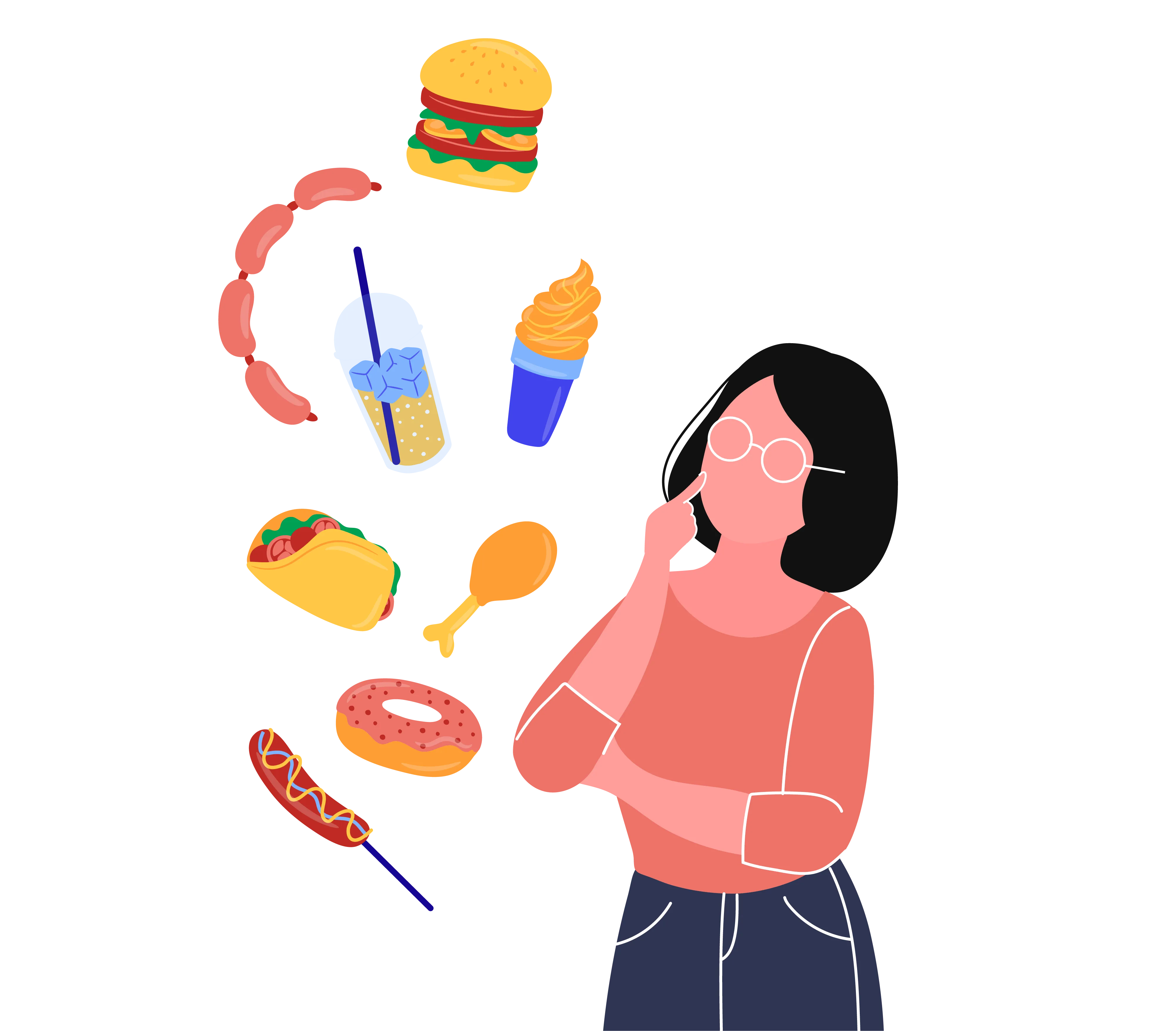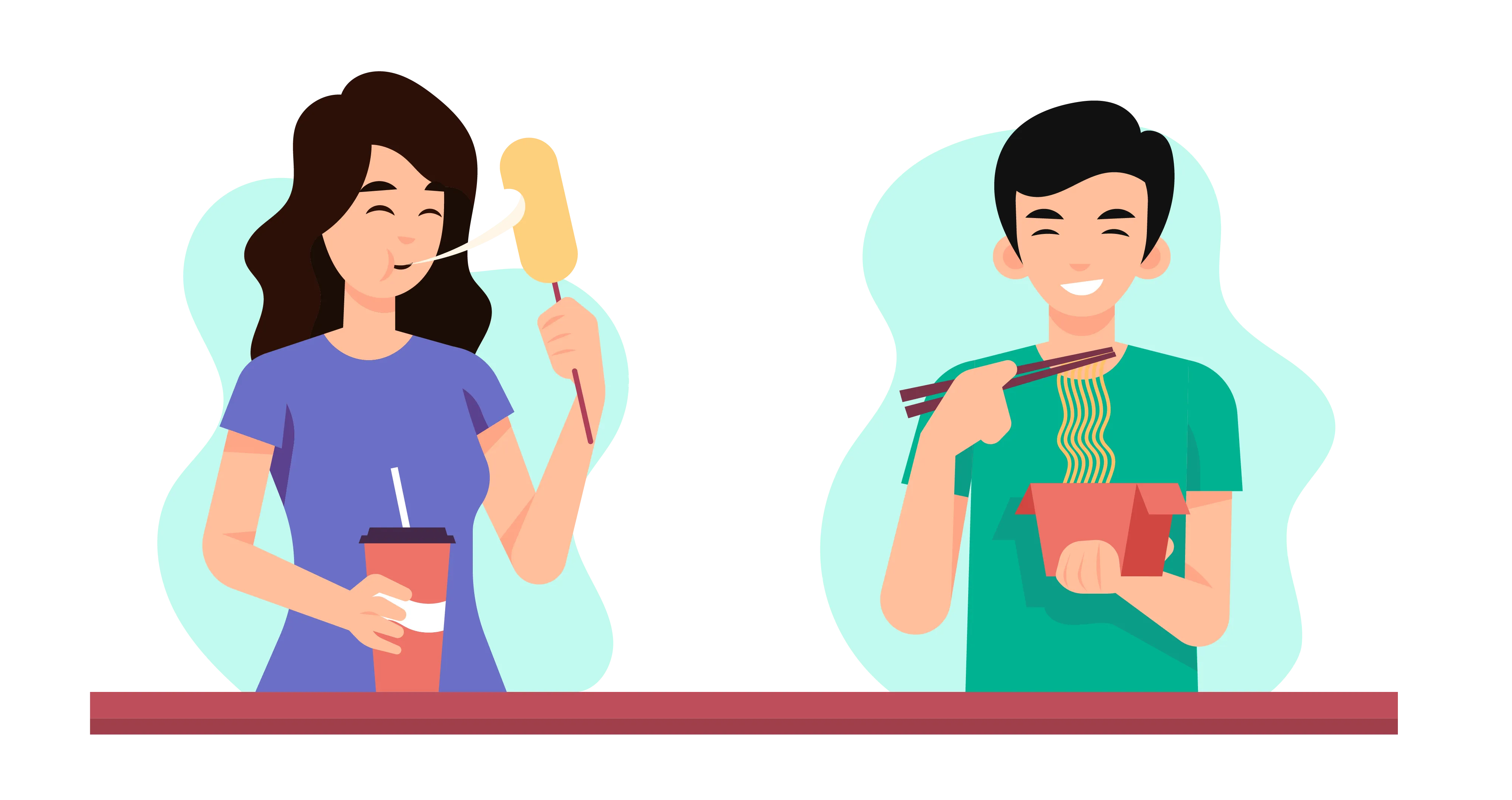Nutrition | 8 min read
How To Control Food Cravings For Weight Loss
Medically reviewed by
Table of Content
Key Takeaways
- Stress and hormonal imbalance can result in a food craving
- Drink a large glass of water in order to curb your cravings instantly
- Exercise and proper sleep help you control unhealthy food cravings
A food craving can be the biggest enemy in your weight loss journey. Food cravings occur due to various mental and physical factors including hormonal imbalances, stress, and lack of sleep or physical activity. When it comes to unhealthy food cravings, people usually desire junk foods high in sugar, fats, and carbohydrates. This is because such foods activate ‘feel-good’ chemicals in your brain, which make you addicted to them.
Indulging in them can further contribute to obesity and cause health problems. Knowing how to stop food cravings and taking steps to curb them can make a big difference in helping you maintain a healthy weight. Read on for some tips to how to stop food cravings.1. Consume Enough Calories
It's crucial to eat properly to keep your body healthy and operating at its peak.
Your body will naturally urge you to eat if you don't get enough calories and nutrients, which can result in intense cravings for particular foods.
Although there is a complicated link between calorie intake and food cravings, the calorie restriction can temporarily make cravings worse.
On the other hand, persistent calorie restriction may be linked to a reduction in both general and particular food cravings.
Regardless, regularly supplying your body with wholesome, filling foods and watching your calorie intake may help reduce food cravings.
2. Refrain From Becoming Insatiably Hungry
Allowing yourself to become overly hungry may increase the likelihood of developing strong food cravings, even though hunger is a natural body signal that shouldn't be feared.
This makes total sense from your body's perspective.
Likely, you last gave your body food a while ago if you're feeling insatiably hungry. Your blood sugar levels may be low, and your body may tell you to eat high-energy foods to bring them back up to the normal range.
On the other hand, you're less likely to experience intense hunger pangs when your blood sugar levels are stable.
Fortunately, you don't need to consume food every two hours to maintain stable blood sugar levels obediently. Instead, eat when your body requests food.
3. Quit Counting Calories
Being overly concerned with calories can lead to a restrictive diet, in addition to taking up time, effort, and mental energy.
Even though some people find short-term benefits in tracking their food intake, persistently obsessing over your caloric intake can harm your relationship with food and add needless stress. Contrarily, if you restrict certain foods excessively or cut back on your food intake to meet a calorie target, you may experience intense food cravings and end up overeating.
Consult a qualified healthcare professional, such as a registered dietitian, for assistance if you are having problems with obsessive calorie counting, excessive food restriction, or food cravings.
4. Lessen Your Intake Of Specific Carbohydrates
Eat less highly refined carbs to help control your appetite. This may be due to the fact that a diet high in highly refined carbohydrates, which has a significant impact on blood sugar levels, may cause brain reactions that fuel cravings for highly appetizing foods.
To manage your food cravings, you do not necessarily need to adhere to a low-carb diet or any other special diet, so don't worry.
Simply concentrate on consuming fewer highly processed carbohydrate foods, like cakes and candy, that are high in added sugar. For filling, healthy substitutes, swap them out for high-fibre, nutrient-dense carbohydrates like sweet potatoes, oats, and butternut squash.
5. Continue To Maintain A Healthy Weight
Maintaining a healthy body weight is crucial for your overall health, which should come as no surprise. It might also lessen cravings for food.
In actuality, more frequent food cravings are linked to heavier body weight.
People with higher BMIs, which measure body weight in relation to height, tend to have greater appetites than those with BMIs regarded as normal.
Those who are overweight also crave highly appetizing foods more frequently than those whose weight is considered to be normal.
A healthy body weight can also help you feel your best by lowering your risk of developing certain chronic diseases, enhancing your body image, enhancing your mental health, and more.

6. Drink Water to Curb Your Cravings
Your body may often confuse thirst with food cravings by misinterpreting the signals received from your brain. If you get a sudden food craving, try drinking a large glass of water instead. If the craving vanishes, it means you were just thirsty. Moreover, drinking water offers many health benefits and helps overweight people to lose weight [1].
7. Reduce Stress to Control Food Cravings
Long-term stressors can make you crave sugary or calorie-dense foods. Stress can also increase levels of cortisol, which is a hormone that can contribute to abdominal obesity [2]. Take measures to control your stress and curb your cravings. Meditate, do yoga or breathing exercises, and plan your tasks better to manage stress.
8. Exercise Daily and Sleep Enough
Quick exercises such as brisk walks help reduce a food craving [3]. If you get the urge of eating junk foods, take a quick walk or perform simple exercises to stop food cravings. Sleep deprivation is also linked to increased food cravings and obesity [4]. Thus, exercising daily and getting an adequate amount of sleep can help control food cravings by lowering ghrelin, a hormone that stimulates appetite.

9. Replace Unhealthy Food Cravings with a Healthy Alternative
Another way to curb your cravings is to satisfy them by eating fruits and fat-free or low-fat foods such as yogurt or buttermilk. A study found that chewing a gum may reduce cravings and appetite [5]. So, you may even chew sugar-free gum to stop food cravings as it is a healthier alternative to sugary or high-calorie foods.
10. Plan Your Diet to Quit Food Cravings
Planning your meals well in advance can help reduce your cravings. Knowing what you will eat beforehand can make you less tempted to crave unhealthy foods. You can even plan when to eat restricted foods as ignoring your cravings completely may have negatives outcomes.
Additional Read: Weight Loss Meal for Women11. Eat More Proteins and Avoid Hunger
Eating more protein reduces your appetite and makes you feel full for a long period [6]. This may help you to curb your cravings and prevent you from overeating. Avoid staying hungry for a long time as it is one of the major reasons for you to experience cravings. Eat healthy food at regular times to avoid sudden hunger pangs.

12. Practice Mindful Eating to Fend Off Food Cravings
Mindful eating means being attentive while eating, slowing down, and chewing your food properly. Avoid using smartphones, watching television, or any other distractions when having your meals. Mindful eating can be compared to mindfulness meditation when it comes to food. Doing so helps you to be aware of your eating habits, hunger, emotions, and sensations. It helps you to understand and differentiate a food craving from real hunger. A study involving obese people revealed that mindful eating significantly reduced weight, binge eating, perceived stress, and physical symptoms [7].
Incorporate these weight management habits to control food cravings. Remember, eating unhealthy foods including carbonated beverages and large meals can cause stomach bloating [8]. This can further lead to pain, discomfort and make your belly look bigger. Consult a nutritionist or a dietician for a personalized diet plan and incorporate these tips to keep your food craving under control. Book an online doctor consultation with specialists near you on Bajaj Finserv Health to take the best care of your health.
FAQ
How can I stop craving so much food?
Try to keep your distance from cravings when you experience them. For example, take a shower or go for a brisk walk to change your focus. A shift in perspective and surroundings could put an end to the craving. Gum chewing can help decrease hunger and cravings.
What causes food cravings?
Food cravings are influenced by the parts of the brain that are in charge of memory, pleasure, and reward. Food cravings may also result from hormonal imbalances, including those involving leptin and serotonin. Even though they frequently exist independently of hunger, cravings also involve the brain's appetite centers.
What vitamins help control hunger?
Vitamins B6, B12, inositol, and folate are the B vitamins that are most crucial for regulating appetite. They can be consumed separately as supplements or, in many cases, taken in combination as a B complex.
What are the three key causes of hunger?
- You don't consume enough protein
- You consume an excessive amount of refined carbs
- You don't get enough sleep
How long can a human go without eating?
The human body can, according to experts, go for up to two months without food.
References
- https://pubmed.ncbi.nlm.nih.gov/19661958/
- https://pubmed.ncbi.nlm.nih.gov/12119665/
- https://journals.plos.org/plosone/article?id=10.1371/journal.pone.0119278#sec012
- https://pubmed.ncbi.nlm.nih.gov/23479616/
- https://www.sciencedirect.com/science/article/pii/S0031938415300317
- https://pubmed.ncbi.nlm.nih.gov/18448177/
- https://pubmed.ncbi.nlm.nih.gov/21130363/
- https://familydoctor.org/condition/bloating/
Disclaimer
Please note that this article is solely meant for informational purposes and Bajaj Finserv Health Limited (“BFHL”) does not shoulder any responsibility of the views/advice/information expressed/given by the writer/reviewer/originator. This article should not be considered as a substitute for any medical advice, diagnosis or treatment. Always consult with your trusted physician/qualified healthcare professional to evaluate your medical condition. The above article has been reviewed by a qualified doctor and BFHL is not responsible for any damages for any information or services provided by any third party.





